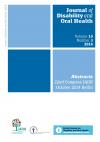Journal of Disability and Oral Health

- Cover Date:
- September 2014
- Electronic ISSN:
- 1470-8558
- Vol:
- 15
- Issue:
- 3
Editorial - The Vision
Editorial - The Vision
The vision of the founding members of IADH was to improve the oral health and quality of life for persons with special needs to an optimal level. IADH is the only global organisation representing the oral health interests of special care patients. Forty years later, several steps are moving us nearer to the fulfilment of that vision. Special Care Dentistry is now recognised as one of the specialties in Dentistry, in a significant number of countries around the world. The journal you are reading, now in its 15th year, is the tip of the sword of IADH and one of the major tools to guarantee improvement in knowledge, and consequently in care. We should therefore acknowledge the efforts of Prof June Nunn, first Editor and Prof Sussumu Uehara and the generous donations of the Japanese Society back in 1998 that gave birth to the journal. IADH, hoping to disseminate knowledge in Special Care Dentistry worldwide, funded and stood behind the DINOH project, a first effort in e-learning and a very innovative project at the time. As the availability of Continuing Dental Education became easier in our ever expanding electronic world, the iADH Executive Committee wisely decided to move to targeted projects and by forming a special Education Committee brought to fruition the curriculum for undergraduate and postgraduate education, putting IADH on the map of strong educational organisations like the Association of Dental Education in Europe (ADEE) in Europe.
right body of people to put the train in the right direction, develop a strong meaningful strategy and at the same time, harness the enthusiasm for new initiatives from its members, old and new. This body should provide a sense of direction, encourage good leadership, encourage collaboration and allow initiatives and new ideas to flow through our organisation. I would call this body a special strategic committee with key persons outside our specialty providing the advice to the leadership (the Executive Committee) and in turn to Council representatives, necessary to ensure the association’s relevancy in this age of information and competing societies. Such a committee will help also raise our profile, and the profile of Special Care oral health towards international organisations such as the WHO, national medical and dental societies and other partners in the health care sector.
Research
Oral Health care for people with disabilities needs to be evidence based. To this end, research is necessary, and although there has been a significant increase in the number and quality of publications addressing this need in recent years, more work is necessary. Further, most academic institutions do not actively support research in this area, or have academic chairs in Special Care Dentistry. As we grow as a specialty, it is important to form a group of clinicians and researchers that can potentially collaborate and work together to provide evidence based approaches and pool patient numbers for research opportunities, generously sharing expertise and mentoring our member countries where there is scant opportunity for training. Local research networks amongst clinical practitioners are a model that has been used successfully in several countries. Prof June Nunn wrote in an editorial in 2008 in the Journal of Disability and Oral Health “In an increasingly competitive world, if we are serious about the specialty and its distinct place amongst other disciplines, we need as individuals and groups to enhance our research efforts. We must now publicise the increasing evidence-base for what we do - that means robust science and high quality papers. Good research does not happen overnight, it takes years in planning and execution. As well as general career support from those well established in the field of Special Care Dentistry, aspiring
Vision for the future
Any organisation must have a well-developed and positive growth strategy. Its visibility, strength and significance depend on that strategy. IADH is no exception to this requirement. It must grow not only geographically, including all countries in its membership, but with significant partnerships to continue to spread the vision of the founding members to the four corners of the world. These partnerships need to be diverse and durable, composed of international foundations, philanthropic organisations and with industry, aligned with iADH’s goals. The Council, the representatives of the diverse societies that form IADH is the locomotive in front of IADH driven by the Executive Committee. The challenge is to find the
62 | Journal of Disability and Oral Health (2014) | 15/3
- Article Price
- £15.00
- Institution Article Price
- £
- Page Start
- 62
- Page End
- 63
- Authors
- D Emmanouil
Articles from this issue
- Title
- Pg. Start
- Pg. End
